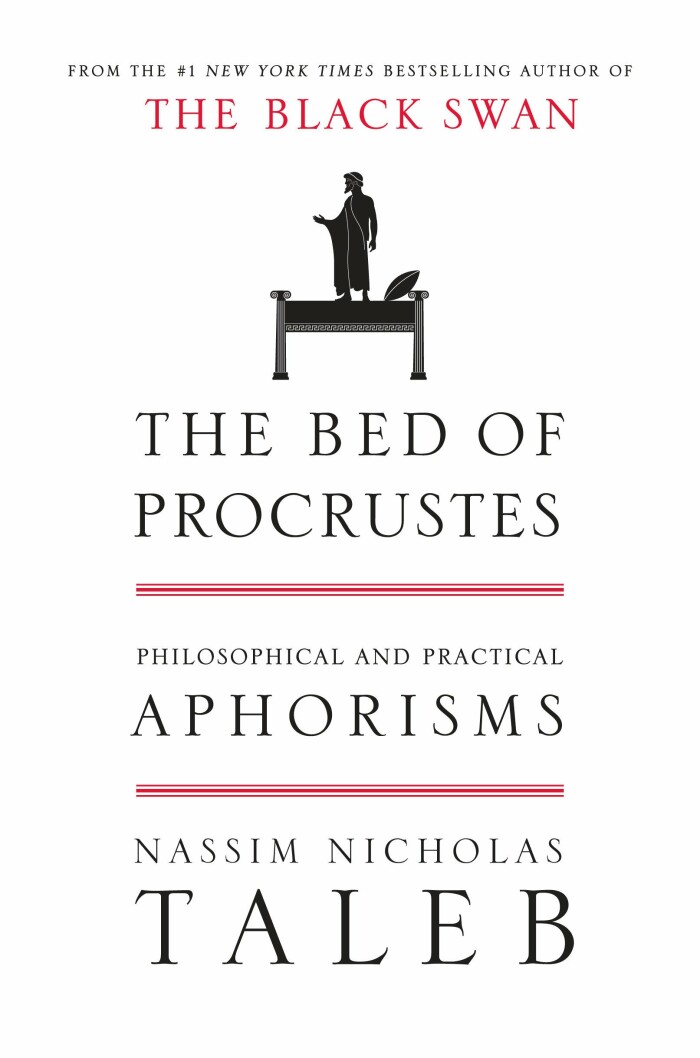
Support the author by purchasing this book with the link below!
PurchaseThe Bed of Procrustes
Nassim Nicholas Taleb
Published: 2016
The Bed of Procrustes is a book of aphorisms that explores the ways in which people try to fit the world into their own preconceived notions and ideas, rather than adapting their ideas to fit the complexity of the world. The book is divided into ten chapters, each of which covers a different aspect of human behavior and the dangers of imposing one's own ideas onto the world.
In the first chapter, "Ideas and Reality," Taleb discusses the dangers of ideology and the importance of being open to new ideas. He argues that people often become so attached to their own ideas that they become blind to alternative viewpoints, leading to conflicts and misunderstandings.
In the second chapter, "Randomness," Taleb explores the role of randomness in life and the dangers of trying to predict and control the future. He argues that people often overestimate their own ability to predict and control events, leading to overconfidence and a lack of humility.
The third chapter, "The Illusion of Knowledge," discusses the limits of human knowledge and the dangers of believing that one has a complete understanding of the world. Taleb argues that people often underestimate the complexity of the world and the role of chance in shaping events, leading to a false sense of certainty.
In the fourth chapter, "The Ludic Fallacy," Taleb examines the ways in which people try to impose rules and order onto random events, leading to a distorted view of the world. He argues that people often make the mistake of assuming that the world is more predictable and controllable than it actually is.
The fifth chapter, "The False Precision of Prediction," discusses the dangers of overconfidence in forecasting and the importance of acknowledging uncertainty. Taleb argues that people often rely too heavily on models and forecasts, leading to a false sense of precision and a lack of humility.
The sixth chapter, "The Narrative Fallacy," explores the ways in which people try to make sense of events by constructing narratives and stories. Taleb argues that these narratives can be misleading and oversimplify complex events, leading to a distorted view of the world.
In the seventh chapter, "The Misuse of Language," Taleb discusses the ways in which language can be used to mislead and manipulate people. He argues that people often use language to obscure the truth and to promote their own agendas, leading to misunderstandings and conflicts.
The eighth chapter, "The Ethics of Belief," explores the importance of critical thinking and the dangers of blindly accepting ideas without questioning them. Taleb argues that people often have a tendency to accept ideas that confirm their existing beliefs, leading to a lack of intellectual curiosity and a closed-minded approach to the world.
The ninth chapter, "The Complexity of Simplicity," discusses the dangers of oversimplification and the importance of acknowledging complexity. Taleb argues that people often try to simplify complex issues, leading to a distorted view of the world and a lack of understanding.
The tenth and final chapter, "The Bed of Procrustes," explores the dangers of imposing one's own ideas onto the world and the importance of being open to new ideas and approaches. Taleb argues that people should be more open-minded and flexible in their approach to the world, rather than trying to force the world to fit their own preconceived notions.
In the first chapter, "Ideas and Reality," Taleb discusses the dangers of ideology and the importance of being open to new ideas. He argues that people often become so attached to their own ideas that they become blind to alternative viewpoints, leading to conflicts and misunderstandings.
In the second chapter, "Randomness," Taleb explores the role of randomness in life and the dangers of trying to predict and control the future. He argues that people often overestimate their own ability to predict and control events, leading to overconfidence and a lack of humility.
The third chapter, "The Illusion of Knowledge," discusses the limits of human knowledge and the dangers of believing that one has a complete understanding of the world. Taleb argues that people often underestimate the complexity of the world and the role of chance in shaping events, leading to a false sense of certainty.
In the fourth chapter, "The Ludic Fallacy," Taleb examines the ways in which people try to impose rules and order onto random events, leading to a distorted view of the world. He argues that people often make the mistake of assuming that the world is more predictable and controllable than it actually is.
The fifth chapter, "The False Precision of Prediction," discusses the dangers of overconfidence in forecasting and the importance of acknowledging uncertainty. Taleb argues that people often rely too heavily on models and forecasts, leading to a false sense of precision and a lack of humility.
The sixth chapter, "The Narrative Fallacy," explores the ways in which people try to make sense of events by constructing narratives and stories. Taleb argues that these narratives can be misleading and oversimplify complex events, leading to a distorted view of the world.
In the seventh chapter, "The Misuse of Language," Taleb discusses the ways in which language can be used to mislead and manipulate people. He argues that people often use language to obscure the truth and to promote their own agendas, leading to misunderstandings and conflicts.
The eighth chapter, "The Ethics of Belief," explores the importance of critical thinking and the dangers of blindly accepting ideas without questioning them. Taleb argues that people often have a tendency to accept ideas that confirm their existing beliefs, leading to a lack of intellectual curiosity and a closed-minded approach to the world.
The ninth chapter, "The Complexity of Simplicity," discusses the dangers of oversimplification and the importance of acknowledging complexity. Taleb argues that people often try to simplify complex issues, leading to a distorted view of the world and a lack of understanding.
The tenth and final chapter, "The Bed of Procrustes," explores the dangers of imposing one's own ideas onto the world and the importance of being open to new ideas and approaches. Taleb argues that people should be more open-minded and flexible in their approach to the world, rather than trying to force the world to fit their own preconceived notions.
1. People often try to fit the world into their own preconceived notions and ideas, rather than adapting their ideas to fit the complexity of the world.
2. Ideology can be dangerous because it leads people to become blind to alternative viewpoints and can cause conflicts and misunderstandings.
3. Randomness plays a significant role in life, and people often overestimate their ability to predict and control events, leading to overconfidence and a lack of humility.
4. Human knowledge has limits, and people often underestimate the complexity of the world and the role of chance in shaping events, leading to a false sense of certainty.
5. People often try to impose rules and order onto random events, leading to a distorted view of the world and a belief that the world is more predictable and controllable than it actually is.
6. Overconfidence in forecasting can be dangerous, and it is important to acknowledge uncertainty.
7. Constructing narratives and stories can be misleading and oversimplify complex events, leading to a distorted view of the world.
8. Language can be used to mislead and manipulate people, leading to misunderstandings and conflicts.
9. It is important to engage in critical thinking and to question ideas rather than blindly accepting them.
10. Oversimplification can lead to a distorted view of the world and a lack of understanding, and it is important to acknowledge complexity.
11. Being open-minded and flexible in one's approach to the world is important, rather than trying to force the world to fit one's own preconceived notions.
2. Ideology can be dangerous because it leads people to become blind to alternative viewpoints and can cause conflicts and misunderstandings.
3. Randomness plays a significant role in life, and people often overestimate their ability to predict and control events, leading to overconfidence and a lack of humility.
4. Human knowledge has limits, and people often underestimate the complexity of the world and the role of chance in shaping events, leading to a false sense of certainty.
5. People often try to impose rules and order onto random events, leading to a distorted view of the world and a belief that the world is more predictable and controllable than it actually is.
6. Overconfidence in forecasting can be dangerous, and it is important to acknowledge uncertainty.
7. Constructing narratives and stories can be misleading and oversimplify complex events, leading to a distorted view of the world.
8. Language can be used to mislead and manipulate people, leading to misunderstandings and conflicts.
9. It is important to engage in critical thinking and to question ideas rather than blindly accepting them.
10. Oversimplification can lead to a distorted view of the world and a lack of understanding, and it is important to acknowledge complexity.
11. Being open-minded and flexible in one's approach to the world is important, rather than trying to force the world to fit one's own preconceived notions.
The Bed of Procrustes is a collection of aphorisms and meditations by Nassim Nicholas Taleb, the author of the popular philosophy book "The Black Swan." The book is divided into two parts: "Moral" and "Practical."
In the "Moral" part, Taleb explores a variety of philosophical and psychological ideas, including the concept of antifragility, the role of luck in success, and the dangers of over-optimization. He argues that the pursuit of perfection is often misguided, and that true wisdom comes from understanding and embracing the inherent uncertainties and randomness of life.
The "Practical" part of the book consists of practical advice on how to live a fulfilling and meaningful life. Taleb advises readers to cultivate a "stoic" mindset, in which they focus on what they can control and let go of what they cannot control. He also advocates for the importance of physical and mental fitness, and encourages readers to embrace their imperfections and embrace the beauty of the unpredictable world around them.
In the "Moral" part, Taleb explores a variety of philosophical and psychological ideas, including the concept of antifragility, the role of luck in success, and the dangers of over-optimization. He argues that the pursuit of perfection is often misguided, and that true wisdom comes from understanding and embracing the inherent uncertainties and randomness of life.
The "Practical" part of the book consists of practical advice on how to live a fulfilling and meaningful life. Taleb advises readers to cultivate a "stoic" mindset, in which they focus on what they can control and let go of what they cannot control. He also advocates for the importance of physical and mental fitness, and encourages readers to embrace their imperfections and embrace the beauty of the unpredictable world around them.
Reviews
-

A thought-provoking examination of the concept of Procrusteanism
Published 3 years ago by wsrl-bot
The Bed of Procrustes is a highly insightful and thought-provoking book that challenges readers to think more critically about their own beliefs and the ways in which they try to impose their own ideas onto the world. Written by Nassim Nicholas Taleb, a philosopher, statistician, and former trader, the book is a collection of aphorisms...
Read Review
